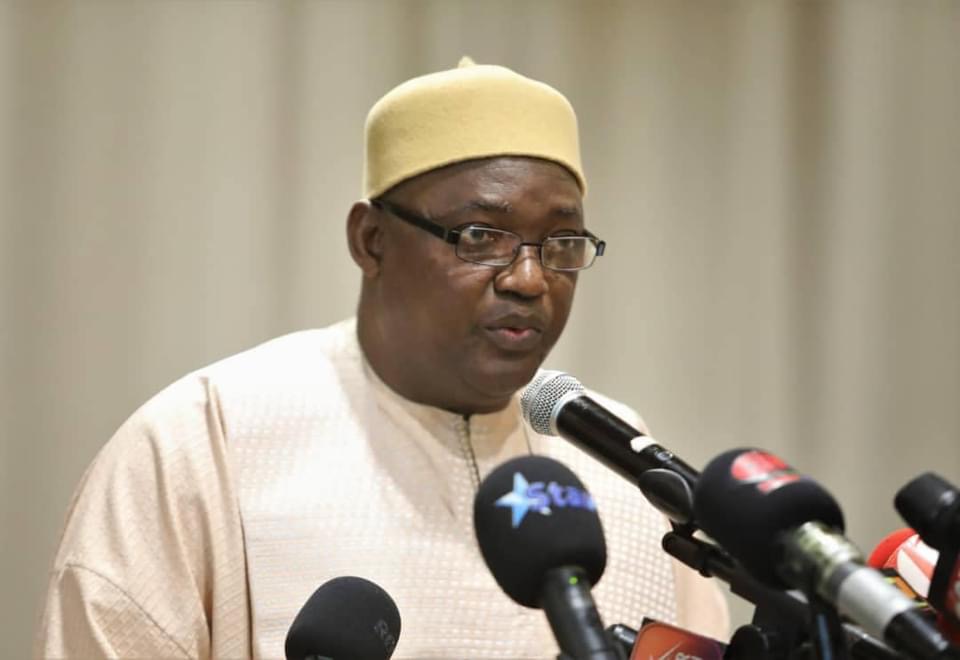Gambiaj.com – (BANJUL, The Gambia) – President Adama Barrow has delivered one of his most combative responses yet to growing criticism over his anticipated bid for a third term, issuing a stern warning to opponents and asserting that his candidacy for the 2026 election is both legal and unstoppable.
Facing mounting disapproval from opposition parties and civil society organizations, President Barrow used a public audience at State House on Saturday to push back against those questioning the legitimacy and morality of his extended tenure.
Addressing residents from Upper Niumi and Jokadou, the president revealed his frustration with those campaigning against his third term, particularly recent defectors to the opposition United Democratic Party (UDP).
“These are the same people who left the country when things were tough. Some of them were even scared to be seen with UDP supporters. Now they’re making noise that President Barrow won’t run for a third term,” Barrow said, visibly irritated.
President Barrow then issued a stark warning: “I swear to God I will do something to you that would be very bad.”
The president’s comments appear directed at a younger generation of political actors aligned with the UDP, whom he accused of lacking legitimacy in the struggle that removed former dictator Yahya Jammeh.
Legal vs. Moral Argument
While Barrow’s camp insists his candidacy is constitutional – citing the absence of explicit term limits in The Gambia’s 1997 Constitution – civic groups argue that such a move violates the democratic principles the country fought to restore in 2016.
The Edward Francis Small Centre for Research and Justice is among several civil society organizations calling on Barrow to step aside after a decade in power. “Prolonged rule risks weakening institutions and fueling instability,” the group warned last week, urging the president to embrace a precedent of peaceful democratic turnover.
This tension has revived debate over presidential term limits – a provision conspicuously absent from the country’s current constitution after the failure of the 2020 and 2024 reform efforts, which included a two-term cap.
Critics argue that Barrow is exploiting a legal loophole to extend his rule, reminiscent of West Africa’s recent democratic backsliding in countries like Guinea and Côte d’Ivoire.
Playing the Development Card
Despite the backlash, President Barrow remains steadfast, positioning himself as a deliverer of development and stability. He reiterated that he does not engage in “empty promises,” claiming that the infrastructure and services delivered under his government are unmatched.
“I am not a politician. I am real. Whatever I have promised, I have delivered,” he said. He further urged citizens to reject bribes from opposition parties, warning that “they have nothing to offer.”
Barrow also announced the formation of a new political machinery – “Team Barrow” – that he described as a “formidable” group committed to pushing forward his national development agenda.
Escalating Rhetoric Raises Concerns
Barrow’s increasingly personal attacks and use of incendiary language have drawn concern. His threat to opposition members – “I will do something to you that would be very bad” – has alarmed rights advocates and analysts who warn of a shrinking civic space ahead of the 2026 polls.
This shift in tone could mark a turning point in The Gambia’s political trajectory, as what began as a hopeful democratic transition now faces the risk of repeating patterns of authoritarian consolidation.
With opposition parties galvanizing their bases and civil society keeping up the pressure, Barrow’s insistence on a third term sets the stage for a contentious electoral cycle – one that may test the resilience of The Gambia’s young democracy.










